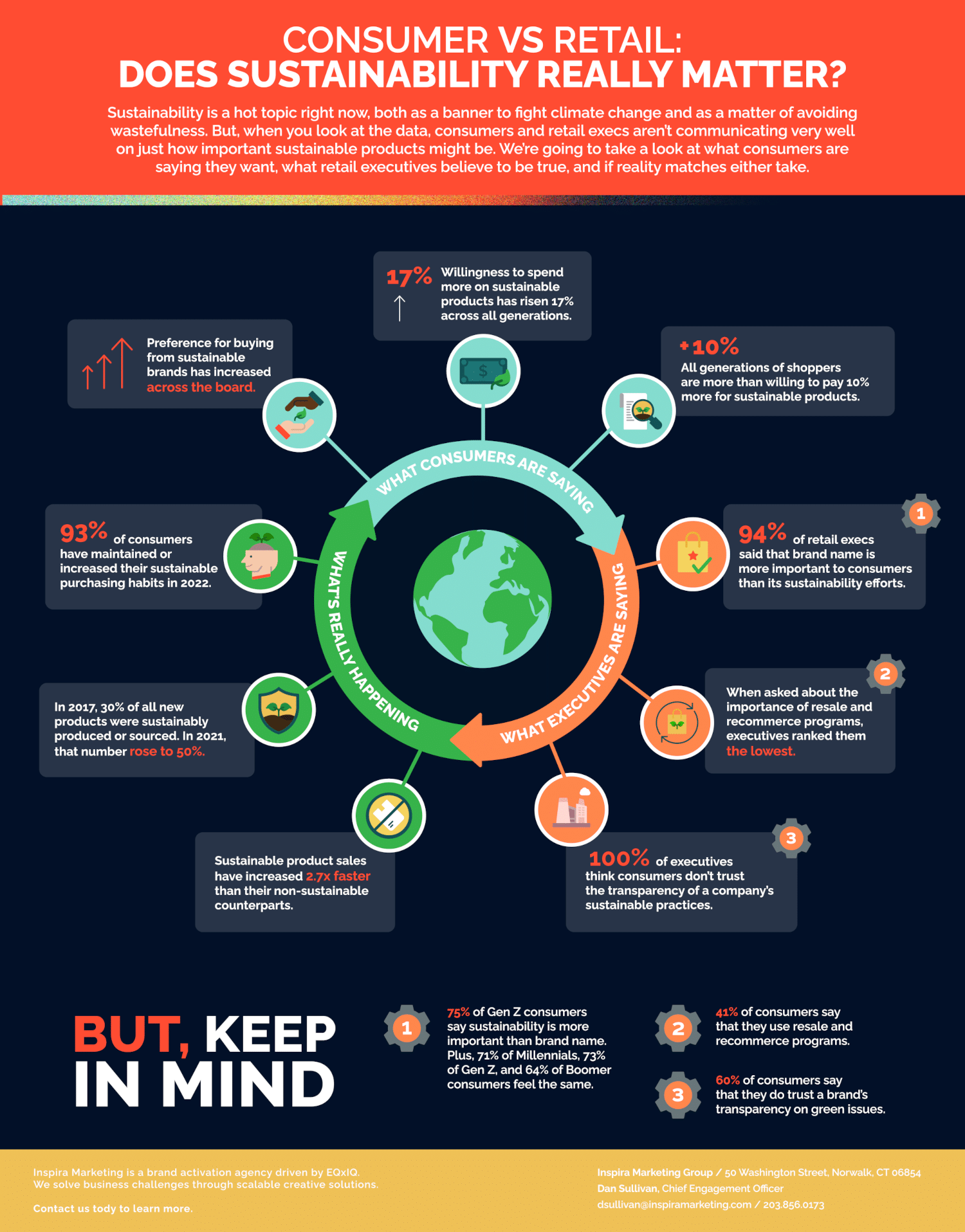Consumer vs. Retail: Does Sustainability Really Matter?
By Bobby Johnson
February 7, 2023
By Bobby Johnson
February 7, 2023
We’re going to take a look at what consumers are saying they want from sustainability efforts, what retail executives believe to be true, and if reality matches either take.

Sustainability is a hot topic right now, both as a banner to fight climate change and as a matter of avoiding wastefulness. But, when you look at the data, consumers and retail execs aren’t communicating very well on just how important sustainable products might be.
Consumers consistently rank sustainable practices as their most important factor in making purchasing decisions. It turns out, shoppers want to believe in their brands.
There’s even evidence showing that Gen Z has actually influenced their parents, Gen X, to become one of the most eco-friendly generations.
Preference for buying from sustainable brands has increased across the board. Since 2019, Baby Boomers are up 6%, Gen X are up 13%, Millennials are up 5%, and Gen Z are up 7%. As Gen Z are the kids of Gen X, who showed the largest increase, it’s likely that Gen Z has been highly influential on their parents’ sustainability preferences.1
Willingness to spend more on sustainable products has risen 17% across all generations. Gen X now has the highest likelihood to pay more of any generation, at 78% (7% higher than Gen Z).1
All generations of shoppers are more than willing to pay 10% higher for sustainable products. Baby Boomers have a shocking 230% increase (from 23% to 76%). Gen X has a 159% increase (34% to 88%), Millennials a 72% increase (50 to 86), Gen Z 50% increase (54 to 81).1
60% of US adults would change their food and beverage brands and go with a more eco-friendly option.2
77% of consumers believe sustainability is important when selecting products to buy, up from 69% in 2021. The top reason consumers say they buy sustainable products is for their environmental impact (44% of those surveyed), followed by the availability of more sustainable options (40%).3
Retail executives aren’t on the same page as consumers when it comes to sustainability. In fact, consumers and retail executives are saying the complete opposite.
It seems brands are having trouble believing just how important sustainability is to their customers.
When asked if they believe consumers would pay more to buy more sustainable products, two-thirds of retail execs said no.4
In fact, 94% of retail execs said that brand name is more important to consumers than its sustainability efforts.4 Yet 75% of Gen Z consumers say sustainability is more important than brand name. 71% of Millennials, 73% of Gen Z, and 64% of Boomer consumers feel the same.1
When asked about the importance of resale and recommerce programs, executives ranked them the lowest. However, 41% of consumers say they regularly use re-commerce programs.4
100% of retail executives think consumers don’t trust the transparency of a company’s sustainable practices. By contrast, 60% of consumers do trust a brand’s transparency on green issues.4
It’s all well and good that consumers are saying they’re choosing more sustainable products, that a clean conscience beats a low price tag.
But are consumers actually walking the walk? Spoiler alert: they kind of are.
What consumers want and how they’re spending seem to be more or less aligned, according to the latest data. However, executives still don’t believe them.
Moving forward, retail brands are going to have to pivot to sustainable products and transparent marketing if they want to stay the brand-of-choice for their customers.
Sources: